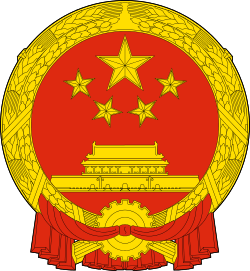Foreign aid to China
| This article is part of a series on the |
| Politics of the People's Republic of China |
|---|
 |
| Commonly known as China |
|
|
|
China portal |
Foreign aid to the People's Republic of China (China since 1949) takes the form of both bilateral and multilateral official development assistance and official aid to individual recipients.
In 1978, China and Japan had normalized the diplomatic relations. Deng Xiaoping had been to Japan to sign the treaty & seen the development of Japan. As a result, China had decided to borrow 220 million dollars in soft loan from Japan when the amount of foreign currency preparation was 167 million dollars & poured the money into social infrastructures.
In 2001 it received US$1.4 billion in such disbursements, or about US$1.10 per capita. This total was down from the 1999 figures of US$2.4 billion and US$1.90 per capita. In 2003 China received US$1.3 billion in such disbursements, or about US$1 per capita. Like other countries in recent years, the United States has rapidly lowered foreign aid to China, reaching about $12 million from USAID for 2011.[1] The aid goes to Tibetan communities, rule of law initiatives, and climate change policy.[1] In 2011, the $3.95 million designated for climate change was the subject of a critical Congressional panel hearing titled Feeding the Dragon: Reevaluating U.S. Development Assistance to China.
Some of this aid comes to the People's Republic of China (PRC) in the form of socioeconomic development assistance through the United Nations (UN) system. The PRC received US$112 million in such UN assistance annually in 2001 and 2002, the largest portion coming from the UN Development Programme (UNDP).
See also
- Foreign aid program of China
- List of charities in the People's Republic of China
- List of non-governmental organizations in the People's Republic of China
Notes
- Note: The People's Republic of China is recognised as the sole representative of China by the United Nations and by many UN members (cf. China and the United Nations, foreign relations of the People's Republic of China). The special administrative regions of Hong Kong and Macau are financially independent. Nongovernmental sources of aid are not accounted under China.